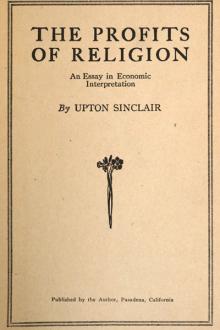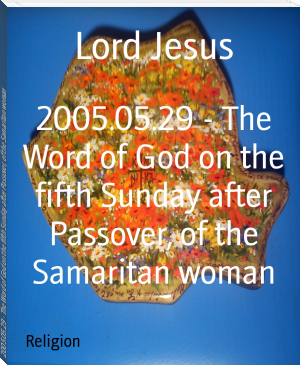The Profits of Religion, Fifth Edition by Upton Sinclair (microsoft ebook reader txt) 📕

- Author: Upton Sinclair
- Performer: -
Book online «The Profits of Religion, Fifth Edition by Upton Sinclair (microsoft ebook reader txt) 📕». Author Upton Sinclair
And go among the sleek, cynical men of the world, the judges and district attorneys, the commissioners of correction and doctors who perpetrated this infamy under, a so-called "reform" administration in New York City—and what do you find? The first thing you find is that they themselves, one and all, practice birth-control with their wives or their mistresses. The second thing you find is that the statute-books are crowded with other laws which they make no pretense of enforcing; for example, the law which forbids the saloons to be open on Sunday—which law they take the liberty of understanding to mean that the saloons shall not have their front doors open on Sunday. You will find that they are not at all afraid of the religious taboos; they are afraid of the religious vote—and even more they are afraid of the campaign contributions of sweat-shop manufacturers and landlords, who cannot see what would become of prosperity if the women of the slums were to cease to breed. So once more we discover the wolf in sheep's clothing, the trader, making use of Tradition-worship; hiding behind the skirts of devout old maiden aunts and grandmothers, who repeat the instructions which God gave to Adam and Eve, "Be fruitful and multiply and replenish the earth." As if God were as blind as a Fifth Avenue preacher, and could see no difference between the Garden of Eden, full of all fruits that grow and all creatures that [230] run and fly and swim, and a modern East Side tenement-room, with an oil stove and no windows and no water-closet, and the price of cabbage seven cents a pound!
Sheep
There are more than a hundred thousand Protestant churches in America. They own more than a billion dollars' worth of property, and in the West and South they dominate the intellectual life of the country. I do not wish to be unfair in what I say of them. They are far more democratic than the Catholic Church; they fight valiantly against the liquor traffic and those forms of graft which are obvious, or directly derived from vice. There are among their clergy many men who are honestly seeking light, and trying to make their institutions a factor for progress. But they are caught in the spirit of Lutheran scholasticism, narrow and ignorant, dogmatic and jealous; and they cannot help it, because they are pledged by their creeds and foundations to Tradition-worship; they have to believe certain things because their ancestors believed them, they have to act in certain ways, because of certain facts which existed in the world three thousand years ago, but which now are known only to historians.
You are familiar with the habit of a herd of sheep to follow the example of their leader; if this leader leaps over a stick, all the rest will leap when they come to that spot, even though the stick may have been taken away in the meantime. The scientist explains this seeming-foolishness by the fact that sheep once lived in high mountains, and fled from their enemies in swiftly rushing herds; when the leader leaped across an abyss, the others had to leap, without waiting to see in the dust and confusion. [231] Now there are no mountains and no enemies, but the sheep still jump. And in exactly the same way the tailor still sews buttons at the back of your dress-coat, because a couple of hundred years age all gentlemen wore swords; in the same way our railroad builders make cars narrow and uncomfortable and liable to overturn, because a hundred years ago all cars were hauled by mules. In the same way the Orthodox Hebrew will eat no pork, in spite of the fact that the microscope affords him complete protection against disease; the orthodox Catholic will not eat meat on Friday, because he thinks Jesus was crucified on that day; the orthodox Anglican will not marry his deceased wife's sister, because of something he reads in Leviticus; the orthodox Baptist requires total immersion in a climate quite different from that of Palestine; the orthodox Methodist refuses to enjoy fresh air and exercise on the Sabbath.
In ancient Judea, you see, the people lived an open-air life, tending sheep and working the fields; so it was an excellent thing for them to rest from labor one day of the week, and to gather in temples to hear the reading of the best literature of their time. But nowadays the city slave spends his week-days shut up in an office, poring over a ledger, or in a sweat-shop, chained to a sewing-machine. Obviously, therefore, the thing to do on the seventh day is to lure him into the open air, and persuade him to run and play. But do we do that, we human sheep? We write ancient Hebrew laws upon our modern statute-books, and if the city slave goes into a vacant lot and tries to play base-ball, we send a policeman and take him to jail, and next morning he is fined five dollars, and probably loses his job.
[232]
In the city where I live, a city supposed to be free and enlightened, but in reality heavily burdened with churches, there are tennis courts built and paid for out of public funds, my own included; yet I cannot use these tennis courts on Sunday, because of the ancient Hebrew taboo. My mail is not delivered to me, the swimming pool in the park is closed to me, the library is closed nearly all day. If I enquire about it, I am told that it is desirable that city employees should have one day's rest a week; but when I ask why it might not be possible to relay the employees, so that they might all have one, or even two days' rest a week, and still give the public their rights on Sunday, there is no answer. But I know the answer, having probed our politics of hypocrisy. There is a "church vote" at which all politicians tremble; there are clergymen, humanly jealous when their peculiar graft is threatened, and hoping that if the law enforces a general boredom, the public may be more disposed to endure the boredom of sermons.
In New York City the theaters are closed on Sunday; but moving pictures having come into being since the days of Puritan rule, the picture-shows are free to keep open. The law permits "sacred concerts"—which, under the benevolent sway of Tammany, has come to mean any sort of vaudeville; so what we have is a free rein to the imbecilities of "Mutt & Jeff" and the obscenities of Anna Held and Gaby Deslys—while we bar the greatest moralists of our times, such as Ibsen and Brieux.
I speak with some crossness of this Sabbath taboo, because of an experience which once befell me. In the second decade of this century of enlightenment and progress, in our free American democracy, whose constitution [233] proclaims religious toleration, and forbids the establishment by the state of any form of worship, I was made to serve a sentence of eighteen hours in the state prison of Delaware for playing a game of tennis on the Sabbath. I was duly arrested upon a warrant, duly sentenced by a magistrate, duly clad in a prison costume, duly set to work upon a stone-pile, duly locked up over night in a steel-barred cell full of vermin—in a building housing some five hundred wretches, black and white, thirty of them serving life-terms under circumstances which never permitted them a breath of fresh air nor a glimpse of the sunshine or the sky. They had no exercise court to their prison, and the inmates were not permitted to speak to one another, but ate their meals in dead silence, and walked back to their cells with folded arms, and had their only occupation working for a sweat-shop contractor; this on the outskirts of the pious city of Wilmington, with no less than ninety-one churches! The writer was informed that he would return to this institution regularly every week unless he abandoned his godless habit of playing tennis on a private club court on Sunday; he only escaped the painful punishment by making the discovery that at the Wilmington Country Club it was the custom of the leading officials of the city and state to play golf every Sunday, and by threatening to employ detectives and have these mighty ones arrested and sent to their own prison. Which shows again the importance of understanding this relationship of Superstition and Big Business!
[234] [235]
CONTENTS
The Church of the Quacks
They may talk as they please about what they call pelf,
And how one ought never to think of one's self,
And how pleasures of thought surpass eating and drinking—
My pleasure of thought is the pleasure of thinking
How pleasant it is to have money, heigh ho!
How pleasant it is to have money.
Clough.
[236] [237]
Tabula Rasa
Nature has given us a virgin continent, a clean slate upon which to write what we will. And what are we writing? What is our intellectual life? I came to the far West, which I had been taught by novelists and poets to think of as a place of freedom. I came, because I like freedom; I am staying because I like the climate. I find that what freedom means in the West is the ability of ignorant and fanatical persons to start some new, fantastical quirk of scriptural interpretation, to build a new cult around it, and earn a living out of it.
My first contact with that sort of thing was when I went to the Battle Creek Sanitarium to investigate hydrotherapy, and found myself in a nest of Seventh-day Adventists. Three generations or so ago some odd character hit upon the discovery that the Christian churches had let the devil snare them into resting on the first day of the week, whereas the Bible states distinctly that the Lord "rested on the seventh day". So here is a million dollar establishment, with a thousand or two patients and employees, and on Friday at sundown the silence of death settles upon the place, and stays settled until sundown of Saturday, when everything comes suddenly to life again, and there is a little celebration, like Easter or New Year's, with what I used to call "sterilized dancing"—the men pairing with men and the women with women.
They are decent and kindly people, and you learn to put up with their eccentricities; it is





Comments (0)